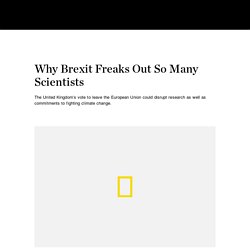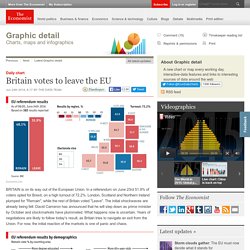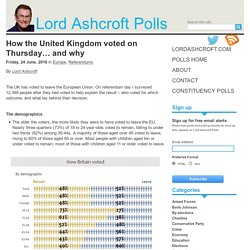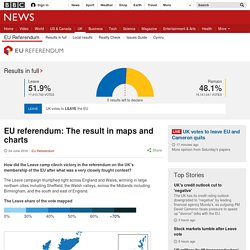

Full Fact. InFacts Home - InFacts. Why Brexit Freaks Out So Many Scientists. The British public’s vote to leave the European Union has set off political and scientific shock waves that could roil Europe and the world for years to come.

The decision has dismayed scientists in the United Kingdom and across Europe, as it stands to disrupt scientific funding and the United Kingdom’s stature in the European and international research communities. “It’s depressing, but the uncertainty doesn’t help,” says Philip Jones, research director of the University of East Anglia’s Climatic Research Unit in Norwich, England.
“I just hope that science doesn’t get forgotten in all of this.” The United Kingdom could spend two years or more negotiating the terms of its divorce from the 28-member economic and political bloc. In that time, the country will have to work through many difficult questions about what the separation means for scientists and for global science policy. Will Brexit Lead to a Science Brain Drain? That’s a significant chunk of change. Explicit cookie consent. BRITAIN is on its way out of the European Union.

In a referendum on June 23rd 51.9% of voters opted for Brexit, on a high turnout of 72.2%. London, Scotland and Northern Ireland plumped for "Remain", while the rest of Britain voted "Leave". The initial shockwaves are already being felt: David Cameron has announced that he will step down as prime minister by October and stockmarkets have plummeted. What happens now is uncertain. Years of negotiations are likely to follow today's result, as Britain tries to navigate an exit from the Union.
A striking amount of the variation in the vote can be explained by demographics. As results trickled in throughout the night, markets were swift and punishing. Once the dust has settled migration and visa-free travel will, for many, be the greatest worry of a looming Brexit. Read more All our Brexit coverage >> How the United Kingdom voted on Thursday... and why. By Lord Ashcroft The UK has voted to leave the European Union.

On referendum day I surveyed 12,369 people after they had voted to help explain the result – who voted for which outcome, and what lay behind their decision. The demographics The older the voters, the more likely they were to have voted to leave the EU. Nearly three quarters (73%) of 18 to 24 year-olds voted to remain, falling to under two thirds (62%) among 35-44s. A majority of those working full-time or part-time voted to remain in the EU; most of those not working voted to leave. How the parties divided A majority of those who backed the Conservative in 2015 voted to leave the EU (58%), as did more than 19 out of 20 UKIP supporters.
Conservative voters constituted just over three out of every ten remainers, and four in ten leavers. When they decided Just under half (43%) of voters said they always knew how they would end up voting or decided more than a year ago. Reasons to leave, reasons to remain National identity. EU referendum: The result in maps.
How did the Leave camp clinch victory in the referendum on the UK's membership of the EU after what was a very closely fought contest?

The Leave campaign triumphed right across England and Wales, winning in large northern cities including Sheffield, the Welsh valleys, across the Midlands including Birmingham, and the south and east of England. The Leave share of the vote mapped our browser does not support this interactive content. Results in detail are available here. Find the result in your area Nine areas voted by over 70% to leave, many of them in eastern England including Boston, South Holland and Great Yarmouth.
The Remain share of the vote mapped The Remain campaign, in contrast, dominated in London, Scotland and Northern Ireland. Seven of the 10 areas with the highest share of the vote for Remain were in London, including Lambeth, Hackney and Haringey, all of which polled over 75% to stay in the European Union. Edinburgh polled over 74% for Remain and Belfast West polled 74.1%.
Key: Tie.